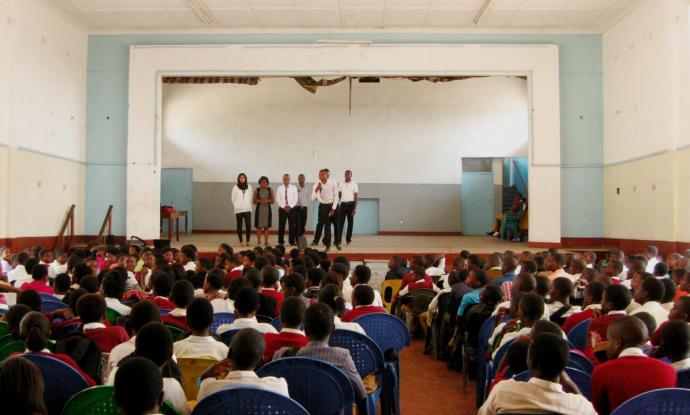
Over the years, SMMHEP has played a key role in the support and delivery of both undergraduate and postgraduate mental health training for doctors in the Malawi. The undergraduate and postgraduate courses in mental health are run at the Kumuzu University of Health Sciences main campus in Blantyre. Established in 1991, the University is the country's only medical school and is part of the University of Malawi. The intake to the medical school is now around 100 per year, all courses are taught in English and students receive an internationally recognised medical qualification.
The Department of Mental Health is headed by Dr Kazione Kulisewa, a Malawian consultant psychiatrist who was himself supported through his training by SMMHEP. The department aims to increase its size and capacity, expanding the number of lecturers and its research output, while building up a critical mass of postgraduate mental health clinicians and researchers.
Undergraduate Psychiatry Teaching
The general psychiatry course is taught to 4th year medical students with four rotations running every academic year.
The course includes lectures at the University, together with clinical teaching at Zomba Mental Hospital and in the outpatient clinic at Queen Elizabeth Central Hospital in Blantyre. Teaching methods include problem-based learning, tutorials and case-based teaching in acute outpatient and inpatient settings. The walk-in outpatient clinic, is run by a Consultant Psychiatrist, psychiatry trainees and psychiatric nurses. Each week, the clinic treats between 100 and 150 patients and when necessary, admits patients to Zomba Mental Hospital. A Malawian clinical psychologist and a visiting psychology lecturer deliver teaching on psychotherapy, mental wellbeing and the cultural aspects of mental health.
All organisations and persons featured in the film gave full permission for their images to be published.
Postgraduate Psychiatry Teaching

The postgraduate training is a four-year course of seminars and clinical training, leading to a Master of Medicine (M.Med) degree. Trainees spend two years in Malawi, supervised by members of the Department of Mental Health and sit Part One of their M.Med exams. They then continue their training in psychiatric subspecialties at the University of Cape Town. So far, three consultant psychiatrists have completed their training with the support of SMMHEP, and others are currently being supported.
E-learning project
The e-learning project aims to build capacity and ensure a sustainable, mental health workforce. Online learning materials have been developed for both undergraduate and postgraduate students. They are also be available to clinical officers, psychiatric nurses and other mental health professionals. Undergraduate resources include interactive problem-based learning scenarios, powerpoint lectures with voice-overs and links to online information. Postgraduate materials are designed to support psychiatry training, so that Malawi will be able to train its own mental health specialists in the future.
Consolidating Psychiatry Capacity Development in Malawi and Zambia (CPMZ) - 2018 ->
This project has supported:
(1) Undergraduate psychiatry teaching at the Kumuzu University of Health Sciences, Blantyre, Malawi, through SMMHEP-supported volunteers
(2) The work to standardize e-learning materials for use in Zambia and Malawi.
(3) Work to strengthen the training environments for psychiatrists and other mental health workers in Malawi and Zambia. This involves setting up a Quality Improvement Partnership between services in Malawi and Zambia through workshops in clinical governance and quality improvement, curriculum development and teaching methods. Workshops were held in July 2019 in Lusaka and in February 2020 at Zomba, where the Quality Improvement teams from Chainama Psychiatric Hospital in Zambia and Zomba Mental Hospital, met to share data on the QI programmes set up under this project. Delegates from both countries also came to Edinburgh, Scotland for Quality Improvement Training and project planning in April 2019.
Completed Projects
Enhancing Mental Health Training in the Districts of Malawi
Adopting a key recommendation of the WHO mhGAP programme, this three year long community-based project used a train-the-trainers model to strengthen the mental health skills and substance misuse expertise of Malawi’s primary health care workers. Operating in five Districts, the project trained more than five hundred clinicians working in primary care or on rotation from District Hospitals, helping to narrow the very wide gap between the services urgently needed in Malawi and those available. The project was funded by the Scottish Government through a Malawi Development Grant and concluded in 2016.
You can read more about the project in the following publications:
- Ahrens, J., Kokota, D., Mafuta, C. et al. Implementing an mhGAP-based training and supervision package to improve healthcare workers’ competencies and access to mental health care in Malawi. Int J Ment Health Syst 14, 11 (2020). https://doi.org/10.1186/s13033-020-00345-y
- Kokota, D., Lund, C., Ahrens, J. et al. Evaluation of mhGAP training for primary healthcare workers in Mulanje, Malawi: a quasi-experimental and time series study. Int J Ment Health Syst 14, 3 (2020). https://doi.org/10.1186/s13033-020-0337-0
Improving Clinical Standards and Teaching at Zomba Mental Hospital
This project arose from Dr Selena Gleadow Ware's work at Zomba Mental Hospital, while she was a SMMHEP-supported lecturer at the College of Medicine (now Kumuzu University of Health Sciences). She held regular case-discussions and taught non-medical staff as well as medical students, working with hospital staff to improve clinical standards. With nursing staff on the female wards, she particularly focused on developing a baby-friendly service for breast-feeding mothers. The project concluded in 2015.
